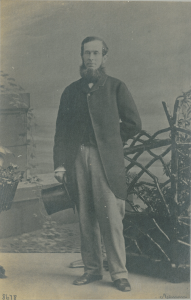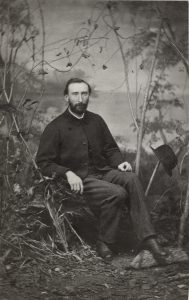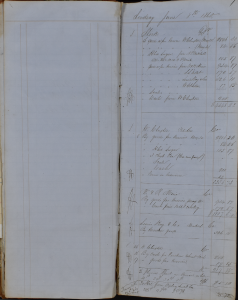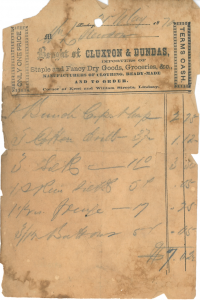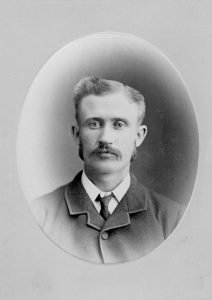Cluxton & Dundas Dry Goods
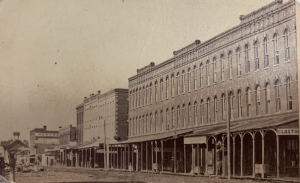
Kent Street in Lindsay, Ontario. Cluxton & Dundas dry good store is located #1 Keenan Block (bottom right of photo). The firm was located here after the fire in 1861 that destroyed most of Kent Street. ca. 1862-1865.
Clerking required doing the less desirable aspects of a job and for many years in J. D.’s case, it would even mean sleeping under a cash counter at the end of each day in his uncle’s store. J. D. would do this while being employed with Cluxton & Dundas from 1864, where he proved to be a valuable asset. J. D. strove to increase efficiency at the busy downtown Kent Street store, using the algebraic skills he demonstrated in grammar school. He was reportedly talented at mental math, adding multiple measurements of cloth and clothing in his head to speed up the processing time of preparing orders. At the same time, William demonstrated his abilities doing the same while working in the Peterborough business centre for James Best.
Before the brothers began working for their uncle,the firm experienced a devastating loss on July 5, 1861. Much of the Town’s centre on Kent Street was swept away by fire, including the premises and inventory of Cluxton & Dundas, which at the time was located at the northeast corner of William and Kent Streets. Closed for only five days as a result, the firm took up temporary headquarters in a wooden shed on William Street N., before moving to the newly constructed Keenan Block shortly afterwards. The daybook from 1860, shown to the right, is the only surviving ledger from the firm, having survived the great fire of Lindsay’s downtown core in 1861.
William and J. D. worked their way up through the ranks of Cluxton & Dundas. Clerking and apprenticing was common for businesses during the 1800s. A big break would come in 1870 for J. D after William Cluxton announced his retirement from his Lindsay dry goods store, handing over full control to J. R Dundas. After six years of hard work and having William join the firm by that years’ end, the brothers got their chance to finally help manage and oversee a growing store. Two years later, with eight years’ total experience of dealing with dry goods, produce, and customer and dealer relations, J. D. was named a silent partner by his uncle. This allowed for his capital to help fund greater expansion into home furnishings and expanded produce. This produced in August of 1878 a partnership that lasted 2 decades under the name of Dundas & Flavelle Bros.


